Contents
Ripe fragrant strawberries are a favorite treat for children and many adults. You can also use it for jam, compote, pies – there would be plenty of berries. But for this you can use such a useful agrotechnical invention as a multi-tiered planting.
How to make yourself
The easiest answer is to buy a finished design in a specialized store. And if this is not possible, then build using virtually any material at hand: boards, boxes, pieces of slate, barrels, old furniture. It is not so difficult to assemble a multi-tiered or vertical garden bed with your own hands. To make such a kind of pyramid, you do not need to have special training.
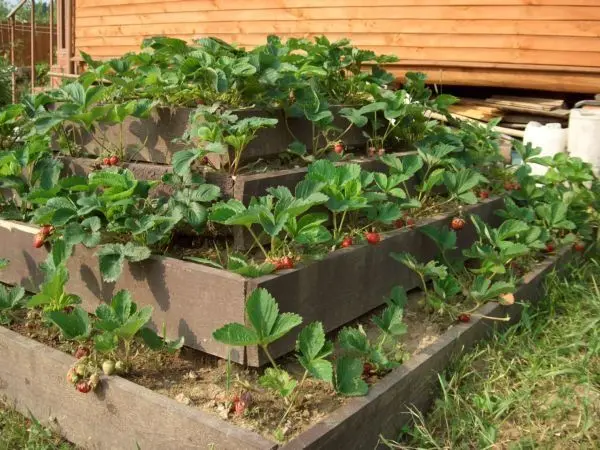
Before arranging multi-tiered beds, two questions need to be resolved – is there enough lighting for future plantings and how even is the relief of the site. Given the second condition, for the arrangement you will need a building level. After marking the site for multi-tiered landings, it is necessary to level it. Also, perhaps, the first tier will need a strong foundation of bricks, which must be made on an already leveled site.
Description of construction
The shape of the structure can be very diverse – round, square, triangular. As a base, we will consider rectangular multi-tiered beds – they are easier to build and it will be easier to care for plants. Ordinary beds for strawberries are recommended to be oriented from east to west – for uniform lighting throughout the day. Similarly, it is worth doing with multi-tiered ones.
The first step is to assemble the lower tier by securing the boards (other material) with nails or self-tapping screws. Keep in mind that the bottom tier is the largest. Each next should be less (as it should be in the pyramid) by the width or two of the width of the beds for the selected crop. In the case of strawberries, the recommended width is 40 cm, the width of the tier should be the same, otherwise it will be difficult to care for the plants. The root system of strawberries goes into the soil by 10-30 cm, based on this, the height of the tier can be made at 30-40 cm.
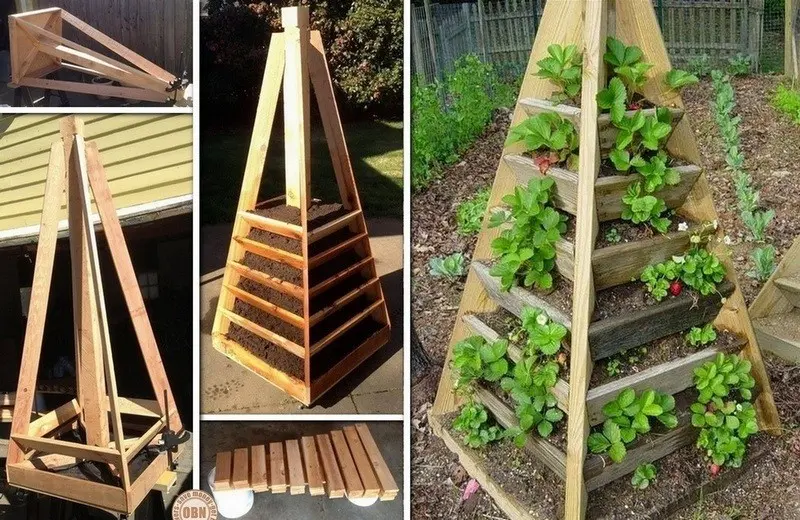
At the bottom of the lower tier, you can lay a stainless steel mesh. Such a mesh with small cells will protect the roots from pests, but at the same time allow soil microorganisms to stick to the bed and process the humus.
There are recommendations to protect the bed with plastic wrap. In this case, water is well retained in the garden, which is useful when building beds in dry areas. However, strawberries love soils with good drainage, so using plastic in multi-tiered beds for this crop is just a bad idea. To make a drainage layer, sawdust or shavings, small branches, dry grass should be poured onto the bottom of the tier.
At the bottom of the tier, you need to pour sawdust or shavings, small branches, dry grass. A layer of fertile soil with humus is poured on top. Each next tier is constructed in a similar way – mesh, sawdust, soil. In total, you can collect up to three or four tiers. The optimal height of a multi-tiered bed, which makes it easy to carry out all the necessary agrotechnical work, is about a meter.
An alternative type of multi-tiered beds for strawberries, and in fact not quite a bed, is growing strawberries in boxes or pots mounted on special poles or even a fence, similar to decorative flowerpots. It is even easier to assemble such a structure with your own hands than a capital multi-tiered bed. The height of the containers for growing should be about 20-40 cm. Drainage should be laid in the bottom of the pots, the pots should be filled with a mixture of earth, peat and humus, watered as needed.
Video “Unusual ideas for garden beds”
Advantages of multi-tiered cultivation
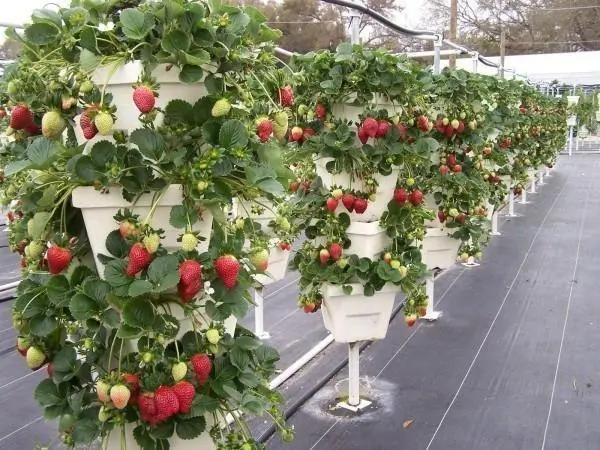
If you make a pyramid-shaped bed for strawberries, you will very soon be able to experience all its benefits. First of all – the convenience for the gardener. Yes, at the very beginning you need to put more effort into arranging the beds, but then it will pay off handsomely when caring for strawberries – there will be no need to constantly bend over or work in a crooked position. So you can make your life much easier with your own hands. Further – saving the space of the site and growing more bushes on the same areas, which means getting large yields.
Also, the condition of the soil is better. Firstly, due to several laying of a metal mesh, access of garden pests to strawberry rhizomes is difficult. Secondly, when preparing the soil, weed roots are removed with their own hands, and to reduce the number of pathogenic microorganisms, the soil can be treated with boiling water or calcined. Thirdly, additional drainage is arranged in the beds, which is important for strawberries. Fourthly, the tiers are raised above the soil and warm up better.
Berries on such beds are much less in contact with the soil and therefore do not rot. In addition, there are special climbing varieties of strawberries just for planting on multi-tiered or vertical beds. And finally, such planting looks like a flower bed and is a wonderful decoration of the garden plot. So in a small area with your own hands you can create both a garden bed and a flower bed at the same time. A pyramid-bed, covered with lush greenery until autumn, can become a decorative highlight of the site.
How to care for strawberries
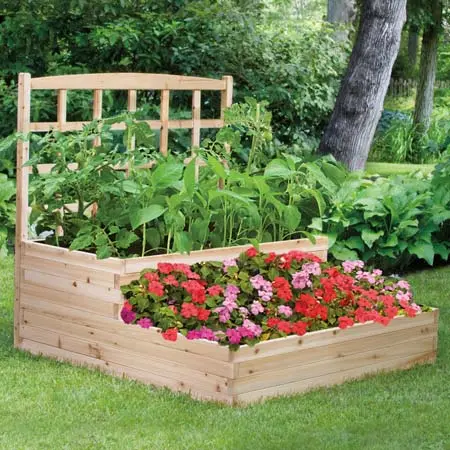
In general, the care of strawberries in multi-tiered pyramid-shaped beds is similar to the usual. The first thing to remember is the quality of the soil. Strawberries take root well and bear fruit on a variety of soils, excluding only too dense and wet, acidic or limestone soils. If you prepare the soil with your own hands, then to fill the multi-tiered beds, it is best to take a mixture of equal parts of turf, humus, peat and small sawdust.
At the same time, humus will give enough organic matter for fruiting. Sawdust will give the soil lightness. Peat retains moisture and slightly acidifies the soil (for strawberries, the optimal acidity level is 5-6 pH). Strawberry bushes are planted in tiers from the bottom up. About 0,5 liters of water should be poured into the hole, the roots should be carefully leveled, the plant should be sprinkled with earth, this should be done carefully, so that the root neck is at ground level.
The soil on multi-tiered beds dries out faster than on ordinary ones, therefore, at first, strawberries need to be watered at least once every three days. After the bushes take root, watering can be reduced, but check the condition of the soil. In dry weather, it is recommended to dig plastic bottles with holes between the bushes, from which water will slowly seep to the roots, or to equip a drip irrigation system with your own hands.
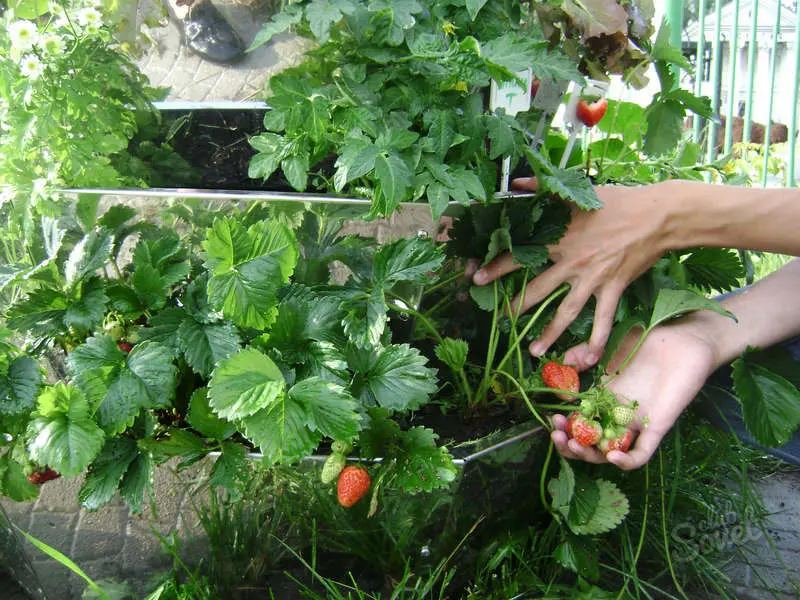
In the first year, mustaches and single strawberry flowers must be removed. In the second and subsequent years, strawberries are fed before flowering. Mineral fertilizers are applied to the soil in liquid form along with irrigation. Fertilizing with organic fertilizers is carried out in the second and fourth years.
On fruiting bushes, mustaches should be removed regularly. After the end of the fruiting season, if you need seedlings for arranging a new strawberry with your own hands, you can leave up to three antennae on the bushes. On the eve of the first frost, all mustaches and all diseased or drying leaves should be removed from the strawberries. The first frosts harden the strawberry shoots. But after the onset of cold weather, you need to think about wintering multi-tiered plantings.
Here the main difficulty is to cover them for the winter. It is clear that multi-tiered beds are better suited for southern regions with milder winters. In the northern regions, multi-tiered beds should be made small and mobile – in pots and boxes. With the first frosts, they must be removed to a non-freezing, but cool room, for example, in the basement.
The capital bed can be insulated with dry straw or spruce branches, and agrofiber can be additionally laid on the upper tiers. However, there is an easier way – to choose for the arrangement of multi-tiered plantings of strawberries with your own hands those varieties that bear fruit well in the first year and renew plantings every year. So you can make a pyramid bed and grow strawberries on it as an annual plant.
Video “Practical idea for building beds”
This video is a great guide for those who need good, neat and even beds in their garden. You will find useful and practical tips here.









